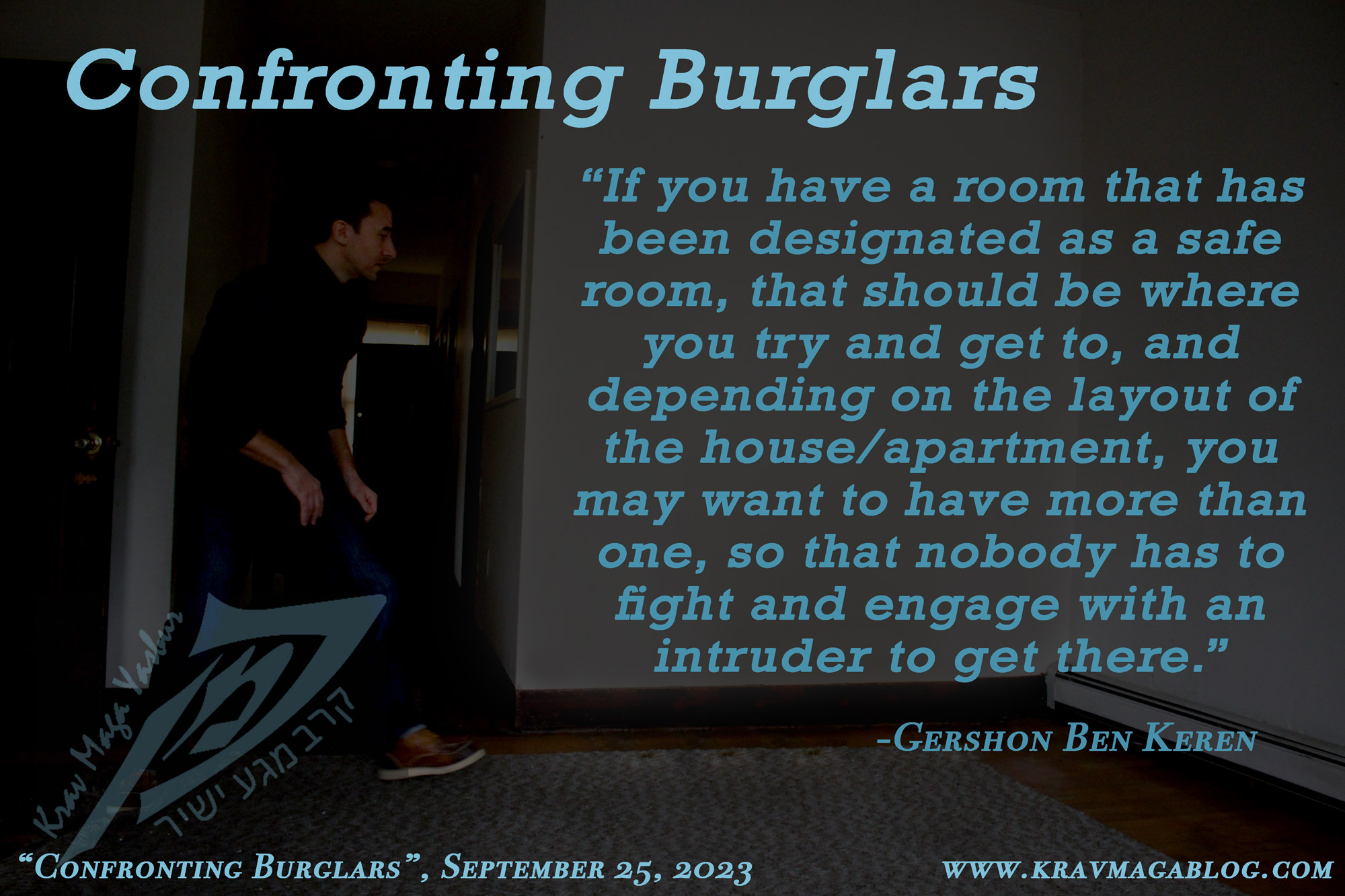Confronting Burglars

Many years ago, when I was living in the UK, a neighbor from a few doors down told me that he’d disturbed a burglar/intruder in his house the previous night/early morning. The first thing to note about this incident is that nighttime residential burglaries are statistically uncommon. Most break-ins to houses occur during the day when the homeowners/residents are out at work, leaving the house unoccupied (commercial burglaries are more common at night, when offices and other buildings are empty). Signs of occupation, such as cars on a driveway, lights, and the TV on etc., are usually a deterrent to offenders looking to break into a property. However, nighttime burglaries do occur e.g., burglary may be a second income for an offender who has a day job, leaving them with only the night as a time they are free to offend etc. They may also occur when an offender, who may not have been planning a burglary, becomes motivated when they see an opportunity that is too good to miss e.g., an open window in what may appear to be an unoccupied property etc. What had happened in this instance was that sometime during the night my neighbor had gotten up to go to the bathroom, and when he opened the bedroom door there was a man at the top of his stairs, just about to step onto his landing. When the man/burglar saw him, he said, “get back in your room and shut the door.” Which my neighbor did. He then called 999 (the UK equivalent of 911). As expected, by the time the police arrived the intruder was long gone. My neighbor’s question to me was, did he do the right thing by following the intruder’s instructions. My general and usually default response when people ask me such questions about personal safety, is that if nobody got hurt/injured then “yes” they did the right thing – this doesn’t mean that the same response should necessarily be applied to similar future incidents of a similar nature but rather, in that particular instance their response “worked”. Going back into the bedroom and closing the door – as requested – allowed the intruder an opportunity to escape whilst knowing that he wasn’t going to be physically challenged or pursued etc. It was not an instruction given to try to gain access to someone, etc. In this article I want to look at certain strategies that can be used when encountering someone in the home who is committing a burglary etc.
Being burgled/broken into is frustrating for a number of reasons. There is often damage done to doors, windows and other access points, property may be taken, police reports need to be obtained, insurance claims made etc. Perhaps the most significant impact of having a home broken into is a sense of violation, with a place that used to feel safe now appearing somewhat vulnerable etc. All of these things evoke an emotional response, and one that may cause us to respond poorly if we confront someone in the process of committing a break-in e.g., we find ourselves in the middle of the night (or during the day), standing across from someone who has broken into our home. We may be tempted to physically engage with them, in response to the injustice committed against us etc. However, caution should be applied here as there is a good chance that even if they came unarmed, the person who has broken in, will have on them the tools that they used to do so, whether this is a wrench, a box-cutter or screwdriver that they used to force a window or door etc. You may also be dealing with two or more, rather than just one individual. This is especially true of young and adolescent offenders who tend to co-offend as they learn their “trade” and gain confidence. My neighbor’s burglar was middle-aged and probably had a fair amount of experience, giving him the confidence to take control of the situation when disturbed. Younger offenders with less experience are much more likely to panic and do something stupid, rather than recognize that their best option is probably to call it a day, and disengage/escape, even if that means doing so empty-handed (my neighbors experience). Also understand that if this is a multiple aggressor situation and you have other family members in the house, you will be putting them at risk if you chose to engage with someone who has broken in e.g., whilst you may be tackling one offender there may be others making there way to the other individuals in your home.
If you have a room that has been designated as a safe room, that should be where you try and get to, and depending on the layout of the house/apartment, you may want to have more than one, so that nobody has to fight and engage with an intruder to get there. Even if you haven’t yet called, it may be worth taking control of the situation, and tell the intruder(s), that the police are on their way and the dispatcher has told you that they will be with you in five minutes, letting your intruders know that this is ample time to escape and get away etc. They should feel pressured to leave rather than feel that their only option is to turn the incident into a hostage situation etc. If you hear something in your home that could potentially be a burglar, calling law enforcement, and then shouting out from the relative safety of whatever room you are in, that you have done this and they’ll be here in 5 minutes, may prompt a swift exit of any unwanted guests in your home. As a note to firearm owners, if you choose to engage, be prepared that you may find yourself in a firefight, if your intruder is similarly armed, and what this may mean for others in your building, as well as making sure your actions are defensible both from a criminal and civil perspective.
 If you enjoyed reading this article you may be interested to read Gershon Ben
Keren's Books (Click on images to go to his Amazon Author's Page). Or If you live in Boston or a surrounding city etc. you may want to sign up for a beginner class,
using the button below.
If you enjoyed reading this article you may be interested to read Gershon Ben
Keren's Books (Click on images to go to his Amazon Author's Page). Or If you live in Boston or a surrounding city etc. you may want to sign up for a beginner class,
using the button below.
Beginner Classes